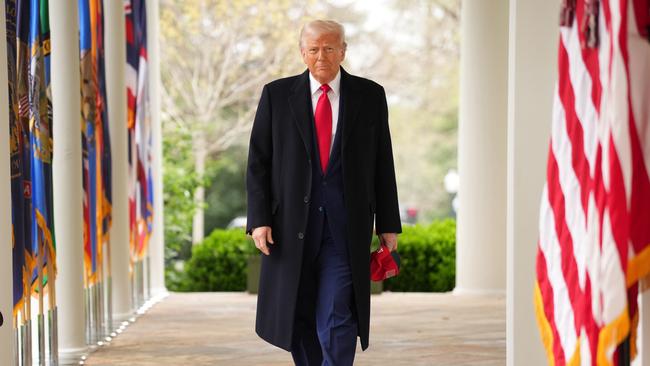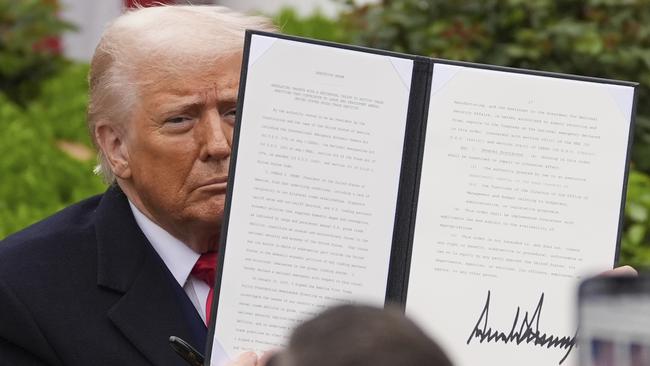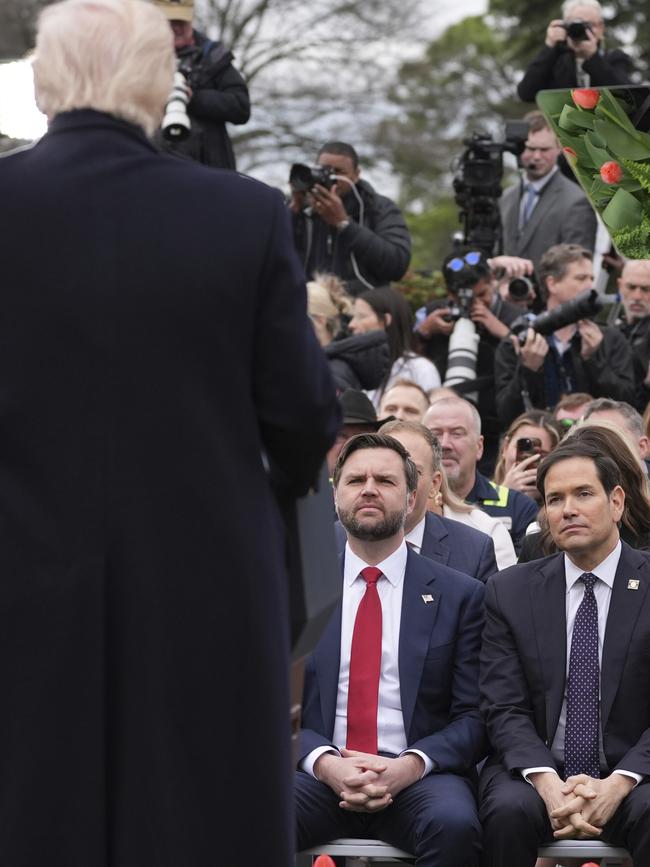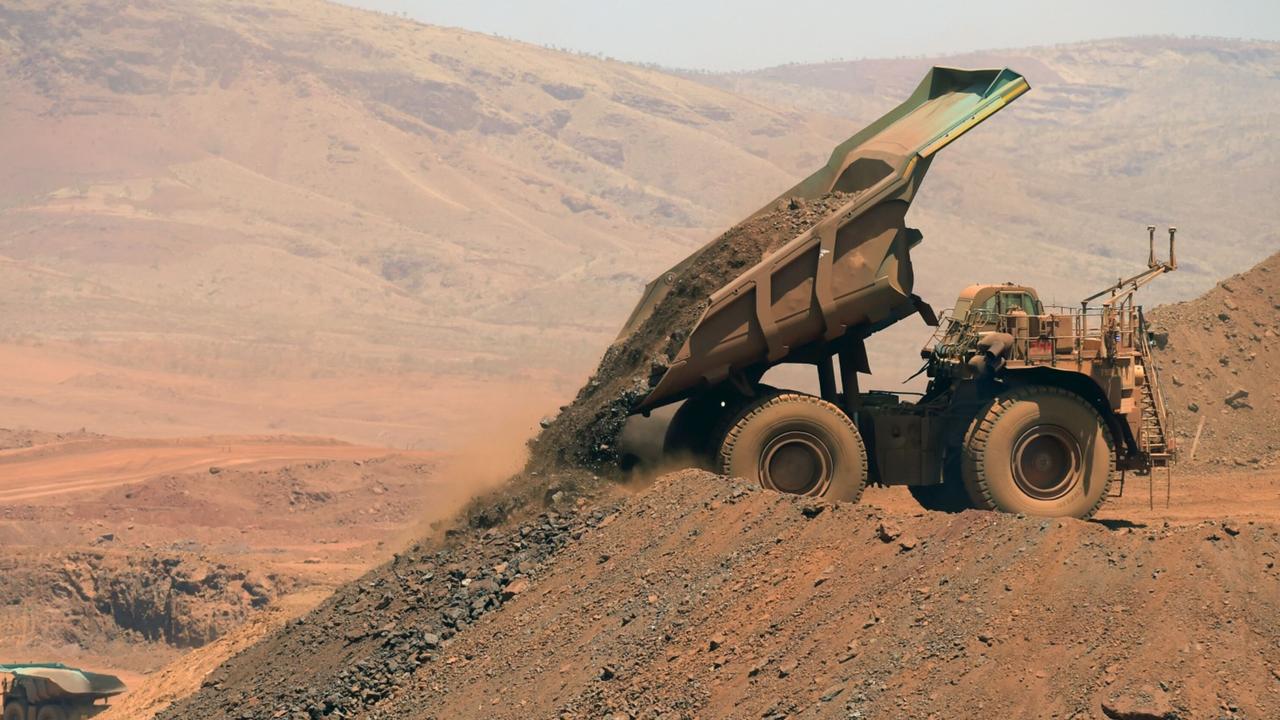‘Dark time ahead for global economy’
The escalation in the global trade war has amplified the risks for the world economy and markets.

Business
Don't miss out on the headlines from Business. Followed categories will be added to My News.
The escalation in the global trade war sparked by the US administration’s “Liberation Day” tariff bloodbath has amplified the risks for the world economy and markets, investors warn.
Donald Trump on Wednesday (Thursday AEDT) announced country-specific tariffs that were much worse than expected, including a combined 54 per cent tariff on China and a 20 per cent tax on EU goods. Australia was hit with a 10 per cent tariff.
As market watchers brace for retaliatory moves from the US’s trading partners, the threat of recession and a return to higher inflation – at least in the near term – are key concerns.
GSFM market strategist Stephen Miller, a former Treasury official, said tariffs would be unambiguously bad for global growth.
“The chance of a global recession in 2025 is now probably better than 50 per cent, and the growth consequences will be compounded should the EU retaliate aggressively. I think it foreshadows a very dark time ahead for the global economy,” Mr Miller told The Australian.

“I worry it won’t be a short, sharp recession but an extended one. And I think markets are in for a very challenging period. This is akin to a supply shock. I think the stagflation period through the 1970s is a good representation of what we’re about to enter. We won’t get inflation in the double digits, but it will be sticky and higher than central bank targets,” he warned.
Australia will not be able to avoid the negative consequences of a trade war due to the blowback from tariffs on China and much of Asia, Mr Miller said.
TenCap co-founder and portfolio manager Jun Bei Liu said tariffs would mean slower growth, particularly in the US, and likely higher inflation.

“This is going to create a real impact on the economy and on businesses. If we keep heading down this path you’ll see companies trying to recalibrate and put up prices. Every company we speak to is talking about increasing prices.
“The growth front is now certainly looking very tough in the US in particular, with consumers and corporates likely to stop spending,” Ms Liu said. At this stage, she is not expecting a global recession.
Ned Bell, chief investment officer at Bell Asset Management, is more optimistic and expects a relaxing on at least some of the tariffs.
“I’m not convinced the magnitude of the tariffs announced will stay on. I don’t think the Americans or Europeans will have the stomach for it, and in time there’ll be a normalisation. So the bite won’t be as bad as the bark,” Mr Bell said.
He is tipping “some sort of resolution” within three to six months.
In the meantime, emerging markets will take the brunt of the pain, but the US consumer will also be hard hit, he warned.
“Emerging markets earnings will be clobbered by this because the magnitude of tariffs on these countries is just so big. What’s been announced is much worse than expected and the market reaction has been very strong.
“There’s some sectors of the market that will really feel it, such as footwear – the likes of Nike. Most footwear is manufactured in Vietnam and they’ve taken a huge hit. That will be borne by those companies and it’ll put a strain on US consumers.”
Ophir Asset Management co-founder Andrew Mitchell sees central banks cutting rates to buffer the economic shock.
“The Fed is also more likely to ease now as growth will be the bigger worry than the one-off nature of a tariff-induced price jump,” he said, adding that the US central bank would want to see hard economic data of a sharp deterioration before cutting.

“The biggest risk here is that tariff negotiations take months and households and businesses stash their cheque books away until the uncertainty is resolved.”
Through the turmoil, investors are split on their risk appetite. The S&P/ASX 200 finished 1 per cent lower on Thursday after paring some early losses.
GSFM’s Mr Miller has taken down his equity exposure and says he may go further. He has also topped up on gold.
“This will be bad for global equities and bad for Aussie equities. Bonds may provide some kind of cushion, but not as much as in the past because inflation is still high. So I’m looking to gold and precious metals to be the big winners.”
Ms Liu and Mr Bell are hunting for bargains amid the rubble.
“As active investors, we love this environment because it gives you the chance to buy companies you like at a good price,” Mr Bell said.
“The next three months will be rough, but you’ll get great buying opportunities. There’ll be a flight to quality to some of the big defensives, consumer staples and healthcare. A big one to watch will be when the US earnings season starts in 10 days and we see guidance come through from corporates.”
Ms Liu expects the tit-for-tat between the US and others will cause more market gyrations in the near term. “We’re seeing the market pull back meaningfully in some sectors, even companies whose earnings won’t really be impacted. So value is appearing in some sectors and I think any kind of stabilisation will see those companies recover quite quickly.”
Ms Liu is eyeing healthcare companies and Australian consumer stocks that are not so exposed to the tariff hit but have “gone down in sympathy with the US consumer stocks”.
For LGT Crestone CIO Scott Haslem, it is still too early to buy the equity dip. “We need to see how things unfold and, ultimately, we’re probably looking for that point where central banks start to step in,” he said.
“US markets are only down about 8 per cent from their peak. One suspects that there’s probably going to be some more weakness over the next few days, and we’ll have to see where that weakness is. We’ll be looking to take opportunities where there’s still good underlying earnings momentum.”
More Coverage
Originally published as ‘Dark time ahead for global economy’





